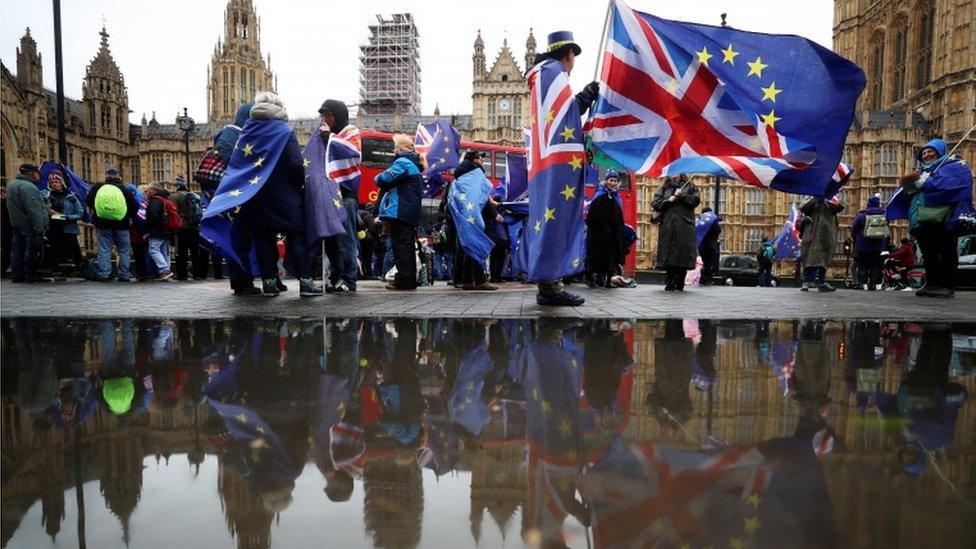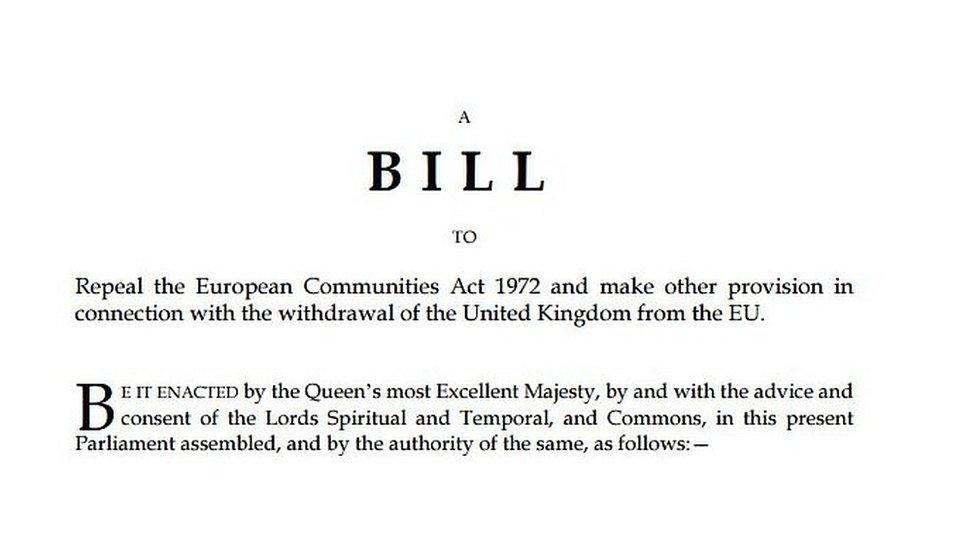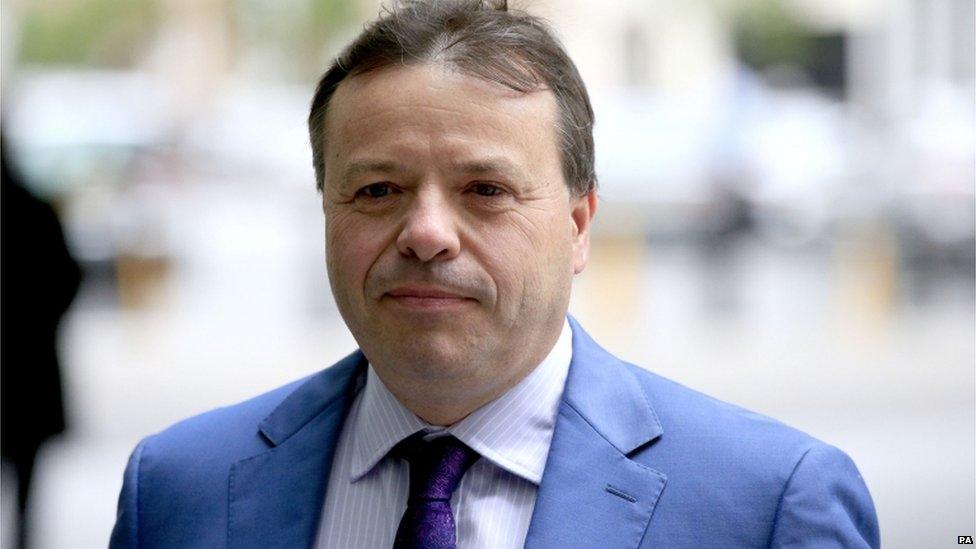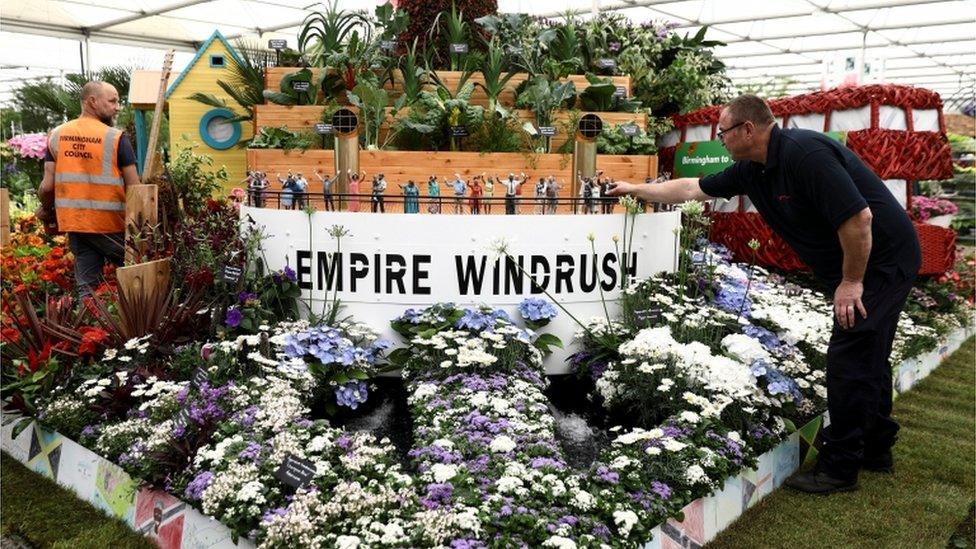Week ahead in Parliament
- Published
- comments

After a tumultuous Westminster week laid bare the government's Brexit divisions, next week's important votes on the EU (Withdrawal) Bill cold rub salt into raw wounds.
The government has now published its response to the 15 amendments on which it lost votes in the Lords - and they vary from flat rejection (on the European Economic Area and the Customs Union) to watering-down (on the meaningful vote) to embracing with a bit of tweaking (the Northern Ireland amendment and the Dubs amendment on child refugees) to outright acceptance (on the continuing relationship with the EU, post-Brexit).
There is a handy cut-out-'n-keep guide, from the ever-helpful think tank, the Institute for Government, here, external.
But what of the politics? Earlier this week the Brexiteers were watching, gimlet-eyed, for a response from the government that shifted it towards a softer-Brexit position, but they now seem mostly happy that no deviation from the previous line has occurred.
For my money, the biggest flashpoints are, first, the amendment on "a" Customs Union, where the symbolic impact of the Commons agreeing an amendment which appeared to back a CU would eclipse the rather modest actual wording.
And then there's the "Hailsham" amendment on a "meaningful vote", which would put the decision on what to do if the government's final divorce deal was rejected by MPs into the hands of the Commons.
It aims to avoid a situation where MPs are told they must choose between the government's deal and leaving the EU without a deal. Brexiteers see this a Trojan horse for a second referendum, or very close alignment with the EU, and the government has offered instead a promise to provide a statement in those circumstances, rather than a vote.
Remainers say that is not much of a concession, and this issue could provide the sharpest confrontation of them all.
On the one hand, the Conservative pro-EU wing - or "economic realists" as they prefer to call themselves - insist they can muster enough votes to agree to the Lords amendments; on the other, there is the question of how many Labour Brexiteers, or Labour MPs in pro-Brexit seats, might vote with the government.
With passions and suspicions running high, the Brexiteers will expect their ministers and whips to die in a ditch to protect their existing policy; and failing that will want retribution visited on the Tory rebels.
The other interesting amendment is the Lords amendment calling for the post-Brexit UK to sign up to the European Economic Area (EEA - the so-called Norway Option). I don't see this being upheld, because the Labour leadership has set its face against this option and a substantial number of Labour MPs would regard signing up to an arrangement which maintained free movement of people as a betrayal of the referendum verdict.
I have a nasty suspicion that the real purpose of this amendment is to drive a wedge between the Corbyn leadership and Remainers in the Labour grassroots.
As for the rest of this week's parliamentary action ("but apart from that, Mrs Lincoln, how did you enjoy the play...?") there are some serious committee hearings and Westminster Hall debates (keep an eye on Yvonne Fovargue's Logbook Loans debate, on Tuesday) but the reality is that Brexit is all.....
Monday 11 June
The Commons meets (2.30pm) for Defence questions, after which the prime minister will probably deliver a statement on the latest meeting of the G7 - and, among other things, the outcome of her bilateral meetings with Prime Minister Trudeau, President Macron and Chancellor Merkel, as well as the wider discussions on Russia, Syria and the global economy. As ever, there may be other post-weekend statements and urgent questions, as well.
The main legislation is the second reading debate on the Counter-Terrorism and Border Security Bill, external, which aims to update the law in the light of the latest understanding of patterns of terrorist behaviour.
It will outlaw the repeated viewing or streaming of terrorist material online, and an extension of the offence of inviting support for a proscribed organisation to cover expressions of support that are reckless as to whether they will encourage others to support the organisation.
It will ensure that individuals linked to the UK can be prosecuted for having encouraged or carried out acts of terror overseas in the same way as if they had committed them in the UK, and it aims to increase the maximum sentence to 15 years for collecting terrorist information.
The day will end with an interesting-looking adjournment debate led by the Cornish Conservative, Steve Double, pointing out that Cornish people have National Minority Status under the Council of Europe's Framework Convention, but are the only recognised British nationality not given the option of a tick box to identify as Cornish in the census. His debate is part of a campaign supported by all six Cornish MPs, Cornwall Council and numerous bodies across Cornwall to make the case for a tick box for Cornish national identity, in the next census.
In Westminster Hall (4.30 pm), there will be a debate on e-petition 205169, external: "Parliament's vote on the Brexit deal must include an option to remain in the EU."
This will be an appetiser for the debate later in the week on the Lords "meaningful vote" amendment to the EU (Withdrawal) Bill. The petition argues that "a lesser of two evils choice between a bad deal and no deal is not acceptable. Our country deserves better than Hobson's choice, and our MPs should be allowed to vote with their conscience to deliver what they believe is best for the country." The petition attracted 113,613 signatures.
In the Lords (2.30 pm) the main debate is on the serious violence strategy, led by the Conservative, Baroness Manzoor.
Tuesday 12 June
The Commons opens (11.30 am) with Business, Energy and Industrial Strategy questions. With a heavy bout of legislation coming up, any statements or urgent questions would have to be, well, urgent, to be allowed to postpone the day's main event, so it may be that the House moves straight on to a Ten Minute Rule Bill on Alcohol (Minimum Pricing) (England), from the Conservative, Fiona Bruce.
The main event is the Lords amendments to the EU (Withdrawal) Bill, external.

It is broken up into two three hour chunks, with the first three hours on the Lords amendments dealing with the system for parliamentary approval for statutory instruments to change EU law, the so-called "Henry VIII powers, the exit date, the Commons "meaningful vote" on the final terms of the divorce deal, the status of retained EU law, and delegated powers.
There will be a series of votes when the three-hour "knife" comes down.
Then, the second session will deal with the amendments relating to Northern Ireland. A further six hours of debate will follow on Wednesday.
In Westminster Hall, debates include Scottish Conservative Kirstene Hair (9.30am) highlighting the problems caused by coastal erosion in her constituency- she warns it threatens the historic golf links and the town of Montrose.
Later, the Conservative Fiona Bruce (11am) leads a debate on the care of prisoners' children - she wants to highlight the estimated 200,000 children each year in England and Wales who are separated from a parent or parents (including as many as 17,000 who lose a mother, and likely primary carer) when their parent is sent to jail. They are not offered the same support as children separated as a consequence of care proceedings so face significantly reduced life chances including an increased risk of mental illness, drug and alcohol addiction.
And keep an eye on the debate on protection from logbook loans led by Labour's Yvonne Fovargue (4pm). Having spent 20 years running a Citizens Advice Bureau, she has emerged as a Commons campaigner on a series of personal finance issues. The aim of this debate is to press the government to keep its promise to legislation.
Logbook loans are a way for borrowers to use their car or van as security for a loan and over the last 10 years their use has rocketed - but if payments are missed borrowers can face swift repossession.
One of the implications is that people who buy second hand vehicles in good faith can find themselves losing the vehicle or having to pay off somebody else's loan. In 2016 the Law Commission, which identifies necessary legal reforms, recommended changes to the law to protect buyers and borrowers, by giving them similar protections to those offered by hire-purchase law, and the government promised to act. But no legislation has materialised. Law commission bills, which make technical changes to laws, can go through Parliament under a streamlined procedure, so rapid legislation could follow.
On the Committee Corridor, there's a lot of interesting action starting with the Science and Technology Committee's first hearing in its energy drinks inquiry, which will examine the effects of energy drinks consumption on the mental and physical health of children and young people. The first panel of this session will hear from health care professionals, dieticians and a representative from one of the teachers unions. The second panel will consist of representatives from parts of the drinks/retail sectors.

Arron Banks now won't be appearing at the Culture Committee's inquiry on Tuesday
And in a change to the advertised programme, Leave.EU funder Arron Banks and his colleague Andy Wigmore have announced they are pulling out of a scheduled appearance before the Culture Committee's inquiry into fake news, accusing the committee of conducting a "co-ordinated witch-hunt of Leave groups".
In the Lords (2.30 pm) questions include the former BBC Chairman, Lord Grade of Yarmouth on harassment of BBC Persian staff by the Iranian authorities, and then peers will turn to the detail of the Civil Liability Bill, external.
Issues at report stage include compensation levels for whiplash injuries. There are concerns that attempts to clamp down on excessive damages may lead to people with genuinely serious claims losing compensation. Watch out for amendments from the Lib Dem peer Lord Sharkey, who has conducted a guerrilla campaign on this issue.
Wednesday 13 June
The Commons opens (11.30am) with half an hour of Wales questions, followed by PMQs at noon. The day's Ten Minute Rule Bill from Labour MP Anna McMorrin, would require producers of packaging products to assume responsibility for the collection, transportation, recycling, disposal, treatment and recovery of those products.
Then it's on to day two of consideration of Lords amendments to the EU (Withdrawal) Bill - with six hours of debate on the amendments covering "a" Customs Union, possible UK membership of the EEA, more on retained EU law, the status of the EU Charter of Fundamental Rights, environmental protection, refugees - and the Dubs amendment, external on the right to family reunion for child refugees, and the continued relationship with EU.
In Westminster Hall, the opening debate (9.30am) is on the review of the business rates system - led by Labour MP Rachael Maskell.
She argues that the business rates system is driving high street business to their knees, both because rates have risen sharply in many areas, following the recent revaluation, and because they are increasingly competing with online sellers who do not face the same tax burden. She wants to probe the direction and timing of the review of the system promised in 2017, and to argue for a switch to a turnover tax, which would be levied on online retailers as well as high street traders.
Other debates include the economic effect of vaccinations in developing countries (2.30pm) and government policy on continuing healthcare for people with terminal illnesses (4pm).

The Environment Committee will be looking at dangerous dogs legislation
On the committee corridor, the Environment, Food and Rural Affairs Committee will hold a one-off session with Defra Secretary, Michael Gove (9.30am) and in the afternoon it will hold the first hearing of its inquiry into Dangerous Dogs: Breed Specific Legislation, which will examine how effective the government's current approach is to protecting the public from dangerous dog attacks (2.45 pm).
And the Women and Equalities Committee continues its inquiries into sexual harassment, with evidence from Karon Monaghan QC of Matrix Chambers and Dr Purna Sen, Director of Policy at UN Women, on sexual harassment of women and girls in public places. Then it turns to the issue of sexual harassment in the workplace with evidence from the Minister for Women, Victoria Atkins (9.50am).
It's a light-looking day in the Lords (from 3pm) with peers polishing off consideration of the Automated and Electric Vehicles Bill, external and dealing with a series of orders and regulations, before debating a report on the EU's attempt to disrupt human smuggling and trafficking networks in the Mediterranean - the clue's in the title: 'Operation Sophia: a failed mission, external'.
Thursday 14 June
It will be the morning after the night before as MPs open (9.30am) with Exiting the European Union questions, where Wednesday's votes may have raised a series of interesting issues for the Brexit Secretary, David Davis, to address. Then comes the weekly Business Statement from the Leader of the House, Andrea Leadsom, who may be pressed for precise dates for the report stage debates on the Customs and Trade bills - which both have important Brexit ramifications, as well as soft-Brexit amendments awaiting them.
Foreign Affairs Committee Chair Tom Tugendhat will deliver a statement on his committee's new report on the Foreign Office's preparations for the 2018 World Cup in Russia, which warned that England fans face an increased risk of attack, because of the UK's deteriorating relations with Russia, in the wake of the Salisbury attack.

The Empire Windrush was commemorated at this year's RHS Chelsea Flower Show in London
After that comes a debate on the 70th anniversary of the arrival of HMT Empire Windrush at Tilbury Docks - among other things the motion notes the critical role its passengers played in post-war reconstruction of the UK and in particular their work to support the establishment of the newly created NHS.
In Westminster Hall Neill Parrish, the chair of the Environment, Food and Rural Affairs Committee, leads a debate on their report on Brexit and agriculture, external, which warns that high tariffs on food imports would raise the cost for consumers, while removing tariffs could lower the cost for consumers but have a devastating effect on agriculture, and could put many UK farmers out of business, leaving the UK dependent on imported food.
That is followed by a general debate on immigration detention of victims of torture and other vulnerable people.
In the Lords (11am) the main events are two debates led by Labour peers - first on the impact of the government's "hostile environment" approach towards illegal immigration on those with residency and employment rights - led by former Chief Whip and Home Office Minister, Lord Bassam of Brighton - and then on the use of personal data harvested from social media sites in recent election campaigns and the government's response, led by another former minister, Lord Knight of Weymouth.
Friday 15 June
It's private members' bill day in the Commons (from 9.30am) and the first item of business will be the report stage and third reading debates on Steve Reed's Mental Health Units (Use of Force) Bill, external also known as "Seni's Law" after Seni Lewis, who died after being restrained during his first mental health episode.
The bill aims to strengthen accountability for the use of force in mental health units - and it has government support. This should be a straightforward event but it looks as if it will be one of those annoying days where debate on a relatively uncontroversial matter is padded out, to prevent bills further down the agenda from having sufficient debate to be voted on.
In this case, the target will be the scheduled second reading of the Labour MP Andy Slaughter's Freedom of Information (Extension) Bill, external - which aims to close what he regards as a major loophole in the FOI Act, which does not normally apply to information held by contractors providing public services, such as housing, health or social care, public transport and prisons.
The Campaign for Freedom of Information, which backs the bill, says the kind of information which has been withheld as a result of this loophole includes information about the number of attacks at privately run prisons, whistleblowing policies of NHS contractors, incentives to issue parking tickets, the cost of TV licensing prosecutions and penalty fares on the London Overground.
And they suggest the Grenfell tower fire has highlighted the need for public access to information held by the providers of social housing.
Further down the batting order, and so unlikely to be debated are bills to create a June Bank Holiday to mark Brexit - from the Conservative Brexiteer, Peter Bone, and to bring in a Statute of Limitations for members of the Armed Forces - from the Conservative Richard Benyon.
The Lords is not sitting.